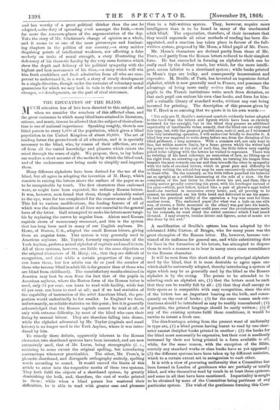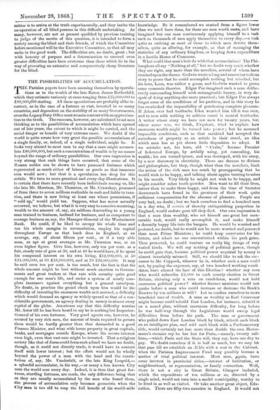THE EDUCATION OF THE BLIND.
AlUCH attention has of late been directed to this subject, and when we consider the numbers of this afflicted class, and the great eminence to which many blind have attained in literature, science, and music, itmust be allowed that the subjectof their educa- tion is one of national importance. Speaking roughly, there is one blind person to every 1,000 of the population, which gives a blind population in the United Kingdom of about 30,000. The art of reading forms the groundwork of all education, and it is specially necessary to the blind, who, by reason of their affliction, are cut off from all the varied knowledge and pleasure which enters the mind through the sense of sight. We propose, then, to lay before our readers a short account of the methods by which the blind read, and of the endeavours now being made to simplify and improve them.
Many different alphabets have been devised for the use of the blind, but all agree in adopting the invention of M. Haiiy, which consists in raising the letters above the surface of the paper so as to be recognizable by touch. The first characters thus embossed were, as might have been expected, the ordinary Roman letters. It was, however, soon found that these, though admirably suited to the eye, were far too complicated for the coarser sense of touch. This led to various modifications, the leading feature of all of which was the abandonment of all lines not essential to the general form of the letter. Gall attempted to make his letters more tangi- ble by replacing the curves by angular lines. Alston used Roman capitals shorn of unnecessary ornament, and this is the system that has long been used in many of our English asylums. Dr. Howe, of Boston, U.S., adopted the small Roman letters, giving them an angular form. This system is very generally used in American asylums. Mr. Taylor, formerly superintendent of the
ork Asylum, prefers a mixed alphabet of capitals and small letters. All of these systems, however, are liable to the same objection as the original characters of M. Haiiy, viz., that they are difficult of recognition, and that while a certain proportion of the young can learn them, but few adults can do so (and the number of those who become blind in adult life is far greater than of those who are blind from childhood). The unsatisfactory results obtained in America may best be seen from the fact that of the pupils in American asylums, where the Boston form of the Roman letter is used, only 34 per cent. can learn to read with facility, while but 65 per cent. can learn to read at all; and if we had statistics of the capability of instruction of the adult American blind, the pro- portion would undoubtedly be far smaller. In England we have, unfortunately, no reliable statistics on this point ; but it is generally acknowledged that the Roman capitals cannot be read at all, or only with extreme difficulty, by most of the blind who earn their living by manual labour. They are therefore falling into disuse, while the alphabet advocated by Mr. Taylor (capitals and small letters) is no longer used in the York Asylum, where it was intro- duced by him.
To remedy these defects, apparently inherent in the Roman character, two shorthand systems have been invented, and are now extensively used, that of Mr. Lucas, being stenographic (i. e., retaining to sonic extent the original spelling, but introducing contractions whenever practicable). The other, Mr. Frere's, is phonetic shorthand, and disregards orthography entirely, spelling words according to sound. It would exceed the limits of this article to enter into the respective merits of these two systems. They both fulfil the objects of a shorthand system, by greatly diminishing the bulk, and, therefore, the cost of works printed in them ; while when a blind person has mastered their difficulties, he is able to read with greater ease and pleasure
than in a full-written system. They, however, require more intelligence than is to be found in many of the uneducated adult blind. The expectation, therefore, of their inventors that they would supersede all other methods of reading has been dis- appointed, and a reaction has taken place in favour of the full- written system, proposed by Mr. Moon, a blind pupil of Mr. Frere.
Mr. Moon's characters are derived partly from those of Mr. Frere, and partly from the Roman letters reduced to their simplest form. He has succeeded in forming an alphabet which can be easily read by the dullest touch, but which, for the more intelli- gent, seems inferior to a shorthand system ; while books printed in Moon's type are bulky, and consequently inconvenient and expensive. M. Braille, of Paris, has invented an ingenious dotted alphabet, which is now generally used in France, and possesses the advantage of being more easily written than any other. The pupils in the French institutions write much from dictation, so that each pupil can emboss his own class books, and form for him- self a valuable library of standard works, without any cost being incurred for printing. The description of this process given by Sir F. Head is so amusing that we quote it in his own words :—
" Not only are M. Braille's embossed symbols evidently better adapted to the touch than the letters and figures which have been so cleverly invented for the eyesight, but to the blind they possess an additional superiority of inestimable value, namely, that the blind can not only read this type, but, with the greatest possible ease, make it, and, as I witnessed this very interesting operation, I will endeavour briefly to describe it. A blind boy was required to write down before me, from the dictation of his blind professor, a long sentence. With a common awl, not only kept in line, but within narrow limits, by a brass groove which the writer had the power to lower at the end of each line, the little fellow very rapidly poked holes tallying with the letters he wished to represent. There was no twisting of his head sideways, no contortion of face, no lifting-up of his right heel, no screwing-up of his mouth, no turning his tongue from beneath the nose towards one ear and then towards the other in sympathy with the tails of crooked letters, which in great pain and difficulty in ordinary writing the school-boy may be seen successively endeavouring to transcribe. On the contrary, as the little fellow punched his holes he sat as upright as a cobbler hammering at the sole of a shoe. On the completion of the last letter he threw down his awl, and then, like a young author proudly correcting his press, with his forefinger instead of his eyes—which, poor fellow, looked like a pair of plover's eggs boiled hard—he touched in succession every letter, and, all proving to be correct, he stretched out his little hand and delivered to me his paper. To test the practical utility of the operation a boy was sent for from another room. The embossed paper (for what was a hole on one side was, of course, a little mountain on the other) was put into his hands, and exactly as fast as his finger could pass over the protuberances made by his comrade, he read aloud the awled sentence which I had heard dictated. I may observe, besides letters and figures, notes of music are also done by the awl."
A. modification of Braille's system has been adopted by the celebrated Abbe Carton, of Bruges, who for many years was the great champion of the Roman letter. He, however, became con- vinced of its unfitness for general use, and while substituting dots for lines in the formation of his letters, has attempted to dispose them in such a manner as to bear in many cases some resemblance to the Roman character.
It will be seen from this short sketch of the principal alphabets used by the blind, that it is most desirable to agree upon one which shall be universally adopted, thereby introducing a system of signs which may be as generally used by the blind as the Roman alphabet is by the seeing. The points to be attended to in selecting such an alphabet are, (1) that the letters must be such that they can be readily felt by all ; (2) that they shall occupy as little space as is compatible with easy recognition, since the size of the letters has an ,important bearing on the bulk, and conse- quently on the cost of books ; (3) for the same reason such con- tractions should be introduced as may be readily remembered ; (4) if possible, the printed language should be easily written ; (5) if any of the existing systems fulfil these conditions, it would be unwise to invent a fresh one.
The disadvantages. arising from the present want of uniformity in type are, (1) a blind person having learnt to read by one char- acter cannot decipher books printed in another ; (2) the books for the blind must necessarily be expensive, but their coat is needlessly increased by their not being printed in a form available to all, while, for the same reason, with the exception of the Bible, scarcely any standard works or class books have as yet appeared ; (3) the different systems have been taken up by different societies, which to a certain extent act in antagonism to each other.
It is with a view of procuring uniformity that a Committee has been formed in London of gentlemen who are partially or totally blind, and who themselves read by touch in at least three systems, and some in all that have been mentioned. Impartiality is sought to be obtained by none of the Committee being partizans of any particular system. The wish of _the gentlemen forming this Com- mittee is to arrive at the truth experimentally, and they invite the co-operation of all blind persons in this difficult undertaking. As many, however, are not at present qualified by previous training to judge of the merits of this question, it is intended to form a society among the blind and their friends, of which the Committee before mentioned will be the Executive Committee, so that all may unite in the good work. The difficulties are, no doubt, great ; but with honesty of purpose and a determination to succeed even greater difficulties have been overcome than those which lie in the way of procuring an extensive and comparatively cheap literature for the blind.







































 Previous page
Previous page